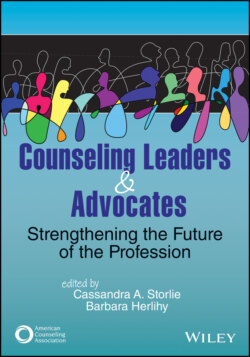Читать книгу Counseling Leaders and Advocates - Группа авторов - Страница 50
Counselor Educator and Supervisor Leadership and Advocacy
ОглавлениеChan et al. (2019) emphasize the role of counselor educators as they advocate for and with their students, conceptualizing this work ecologically. Faculty attend to student needs in the classroom, in their programs and departments, in field service activities, and across their universities. Furthermore, counselor educators influence the counseling profession through their scholarship and leadership roles, including serving in professional associations and on state boards. These leaders bring expert testimony to state and national legislatures and advocate for clients and the profession. One of the unique aspects of their work is that counselor educators and supervisors advocate for consumers of counseling services as well as for their students/supervisees. Servant leadership is particularly important in inspiring these up and coming leaders of the profession to be the next generation of advocates. Many counselor educators are also providing supervision, and some supervisors are working in the field directly for schools and agencies. We will focus on how counselor educators may lead and advocate, and then examine how field supervisors may do so in their respective positions.
In counselor education programs, educators can support students who face cultural, economic, and other social barriers that may impede their success (Chan et al., 2019). This may be in their role as teacher, advisor, or supervisor. International students who experience acculturative stress and social hardships may find it particularly difficult to continue their studies, manage stress, and navigate the bureaucratic requirements of being in another country while trying to handle the already difficult challenges of being a graduate student (Behl et al., 2017). Counselor educators, serving as academic advisors, play an important role in advocating with university international affairs offices, who serve as liaisons with the U.S. government, and with international consulates and other organizations that often require letters of support and status updates. Domestic students experiencing financial hardships, social oppression, and personal setbacks also may benefit from having faculty allies. It is important for programs to hire diverse faculty to broaden the perspectives of counseling programs and build bridges of cultural understanding (Baggerly et al., 2017). Once hired, those from historically marginalized groups may benefit from peer advocacy, particularly as they face institutional barriers and are unjustly challenged by students, colleagues, and administrators (Cartwright et al., 2018).
Moving outside of the ecosystem, counselor educators can also advocate at the macro level, engaging in legislative action (Chan et al., 2019). Farrell and Barrio Minton (2019) found that counseling leaders can engage in legislative professional advocacy (LPA) through a process of being catalyzed by internal personal and professional motivators, resourced by local communities and professional networks, and enacted through prioritizing various forms of engagement with legislators. Indirect engagement, or practical advocacy, may come in the form of writing letters, calling a legislator, signing petitions, or building LPA into a course syllabus.
Direct advocacy occurs when counselor educators meet with legislators in person. Some state counseling associations host legislative advocacy days, or “Days on the Hill” (Farrell & Barrio Minton, 2019, p. 153), and counselor educators may include such activities in their courses as one form of service learning. Organizers of legislative advocacy days may lead participants through at least four steps of Trusty and Brown’s (2005) model: developing relationships and knowledge about key issues, defining the professional advocacy problem(s), preparing talking points and handwritten notes to address congressional representatives, and meeting with elected leaders. Chapters of Chi Sigma Iota, Counselors for Social Justice, and other groups may provide advocacy leadership by organizing transportation to these events or even coordinating them with their own legislative initiatives. Similarly, counselor educators may invite legislators to their classrooms to host constructive dialogue around local counseling concerns and legislative needs to support the mental health and overall wellness of their constituents.
Like counselor educators, supervisors in the field can support the leadership and advocacy development of student interns as well as early career professionals. Storlie, Baltrinic, et al. (2019) interviewed seven current or former site supervisors and discovered that they fostered leadership and advocacy through a process of modeling a strong professional counselor identity, appropriate clinical practices, and health self-care. These supervisors also served as leaders and advocates by involving their supervisees in learning experiences, advocating for them to have time and resources, and empowering them to think on their own and be self-advocates. In summary, supervisors and counselor educators alike have important roles to play in guiding the next generation of professional counselors to be effective advocates for the profession, for their clients, and for themselves.
